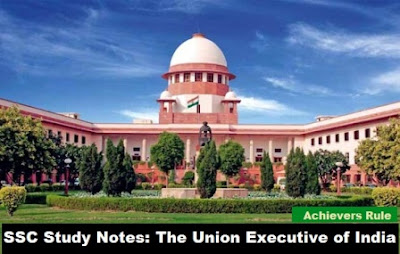
All about Union Executive (President of India)
Today we are going Share a very important Study Materials for Your Upcoming SSC Exams. This Study Notes Cover The Council of Ministers, The President, The Vice President and The Prime Minister. Here we discuss in details.
The Council of Ministers: The Union Executive
According to the Prime Minister of India a Council of Ministers is set up to co-operate the work process of President of India.It is three types:-1.Cabinet Ministers, 2.Ministers of Sates and 3.Deputy Ministers.The Council of Ministers dependent as per rule and regulation near to Lok Sabha according to Article-75(3).91st Amendment of the Indian Constitutions restricts the size of the Union Ministry. ‘Cabinet‘means Ministers with cabinet ranks.
The President: The
Union Executive
The Vice-President: The
Union Executive
Selection
procedure mentioned in Article-63.
Minimum
age should be-35 years.
Tenure
of President-5yrs.
The
Vice-President of India is elected by-Members of Lok Sabha and Rajya Sabha.
The
Vice-President is the ex-officio chairmen of the Rajya Sabha.
If
President wishes to resign he address to his resignation letter –to
Vice-President.
The
Supreme court of India has to look into all disputes with regard- to the
election of the Vice-President
The
Vice-President of India continues to be in office even after the expiry of
his term till his successor takes place.
Vice-President
of India can be removing by –Rajya Sabha alone.
Vice-President
who also selected as a President in India is:-1.Dr.Radhakrishnan, 2.Dr.Jakir
Hosen, 3.V.V.Giri, 4.R.Vencatramen, 5.Dr.Sankar Dayal Sharma, 6.K.R.Narayana.
The Prime Minister: The
Union Executive
Selection
procedure mentioned in Article-75(1).
Minimum
age should be-25 years.
Tenure
of Prime Minister-5yrs.
Prime
Minister has the actual power under the Parliamentary form of Government.
Janata
Dal party provided two Prime Minister in two year’s two times.
The
Prime Minister is the Chairmen of National Integration Council.
Prime
minister remains in his office as long as the support of majority of Lok
Sabhs and confidence of Rajya Sabha.
Without
becoming a Union Cabinet Minister H.D.Deve
Gowda became Prime Minister.
Anti
Defection bill was passed by Rajiv Gandhi prime
minister of India.
Chaudhary Charan Singh the Prime Minister of
India resigned before facing a vote of no-confidence in the Lok Sabha.
Sardar
Ballabhbhai Patel was the 1st deputy Prime minister in India.
The President: The Union Executive
The Vice-President: The Union Executive
|
Selection
procedure mentioned in Article-63.
|
|
Minimum
age should be-35 years.
|
|
Tenure
of President-5yrs.
|
|
The
Vice-President of India is elected by-Members of Lok Sabha and Rajya Sabha.
|
|
The
Vice-President is the ex-officio chairmen of the Rajya Sabha.
|
|
If
President wishes to resign he address to his resignation letter –to
Vice-President.
|
|
The
Supreme court of India has to look into all disputes with regard- to the
election of the Vice-President
|
|
The
Vice-President of India continues to be in office even after the expiry of
his term till his successor takes place.
|
|
Vice-President
of India can be removing by –Rajya Sabha alone.
|
|
Vice-President
who also selected as a President in India is:-1.Dr.Radhakrishnan, 2.Dr.Jakir
Hosen, 3.V.V.Giri, 4.R.Vencatramen, 5.Dr.Sankar Dayal Sharma, 6.K.R.Narayana.
|
The Prime Minister: The Union Executive
|
Selection
procedure mentioned in Article-75(1).
|
|
Minimum
age should be-25 years.
|
|
Tenure
of Prime Minister-5yrs.
|
|
Prime
Minister has the actual power under the Parliamentary form of Government.
|
|
Janata
Dal party provided two Prime Minister in two year’s two times.
|
|
The
Prime Minister is the Chairmen of National Integration Council.
|
|
Prime
minister remains in his office as long as the support of majority of Lok
Sabhs and confidence of Rajya Sabha.
|
|
Without
becoming a Union Cabinet Minister H.D.Deve
Gowda became Prime Minister.
|
|
Anti
Defection bill was passed by Rajiv Gandhi prime
minister of India.
|
|
Chaudhary Charan Singh the Prime Minister of
India resigned before facing a vote of no-confidence in the Lok Sabha.
|
|
Sardar
Ballabhbhai Patel was the 1st deputy Prime minister in India.
|










Post a Comment